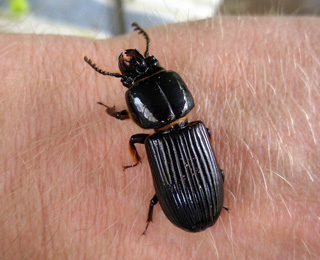Why Hotel Intestine?
Quite simply, the richest diversity of life on Earth is probably represented by the gregarines in the intestines of insects. Seems like a place where one should spend some time and try to learn something.
Our goal at Hotel Intestine is to provide a widely-distributed gregarine knowledge base that integrates new gregarine species and ecological associations discovered through basic biological survey, systematic revision of existing information, and specimens. The Hotel Intestine staff includes several undergraduate researchers and a research technician under the direction of Dr. Rich Clopton at Peru State College in Peru, Nebraska. In keeping with the traditions of our home institution, our program focuses on undergraduate teaching and research through hands-on training of the next generation of systematists. The first question in zoology is "What is it?" We are training scientists to answer that question for the new millenium.
The National Science Foundation has generously provided support for our work since 1997, funding three major projects.
1997-2000: Microbiological Survey & Inventory: Eugregarinida (Protista: Apicomplexa) parasitizing selected mandibulate arthropods of the Nebraska Sandhills was a biological survey and inventory of gregarines parasitizing arthropods primarily insects) of the Nebraska Sandhills, including summer survey work in the sandhills and systematic work in our laboratory throughout the year through grant award DEB-9705179.
2004-2007: Microbiological Survey & Inventory of gregarines parasitizing aquatic and riparian insects of the Texas Big Thicket. was a biological survey and inventory of gregarines parasitizing insects of the aquatic and riparian zones of the Big Thicket region in Texas, including year-round survey work in the Texas Big Thicket region and systematic work in our laboratory throughout the year. This work was supported by the National Science Foundation through collaborative grant awards NSF0340774 to Dr. Clopton at PSC and NSF0340782 to Drs. Cook at Sam Houston State University, Huntsville, Texas.
2010-present: Biodiversity Inventory: Gregarines Parasitizing North American Cockroaches. We are currently working to discover and understand the gregarine fauna parasitizing North American cockroaches. This is a more targeted survey than our prior work, but it serves 2 additional purposes. First, it allows us to survey the cockroach species of eastern North America, the first such survey in almost a century. Second, it allows us to focus our biodiversity work on questions of speciation and evolution in a few target gregarine genera. The work includes several intensive collecting and insect culturing trips each year to support systematic, experimental, and molecular work in the lab throughout the year, funded through grant award DEB-1019419.

